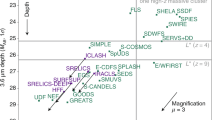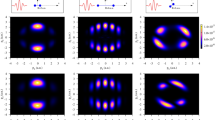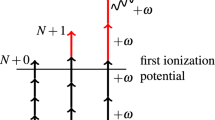Abstract
IT has been claimed recently1 that some redshifts can be explained by considering a new type of process in which the incident photon scatters inelastically on the 3K radiation to give four less energetic photons. The Lagrangian responsible for the interaction is taken as Λ(AμAμ)2 and the process is considered in the second order only to account for the necessary strong peaking of the cross-section (see Fig. 1). Here we describe the detailed calculation of this process.
This is a preview of subscription content, access via your institution
Access options
Subscribe to this journal
Receive 51 print issues and online access
$199.00 per year
only $3.90 per issue
Buy this article
- Purchase on Springer Link
- Instant access to full article PDF
Prices may be subject to local taxes which are calculated during checkout
Similar content being viewed by others
References
Pecker, J. C., Roberts, A. P., and Vigier, J. P., Nature, 237, 227 (1972).
Author information
Authors and Affiliations
Rights and permissions
About this article
Cite this article
ALDROVANDI, R., CASER, S. & OMNÉS, R. Comment on “Non-Velocity Redshifts and Photon-Photon Interactions”. Nature 241, 340–341 (1973). https://doi.org/10.1038/241340a0
Received:
Issue Date:
DOI: https://doi.org/10.1038/241340a0
This article is cited by
-
Generalisation of Hubble's Law
Nature (1974)
Comments
By submitting a comment you agree to abide by our Terms and Community Guidelines. If you find something abusive or that does not comply with our terms or guidelines please flag it as inappropriate.



